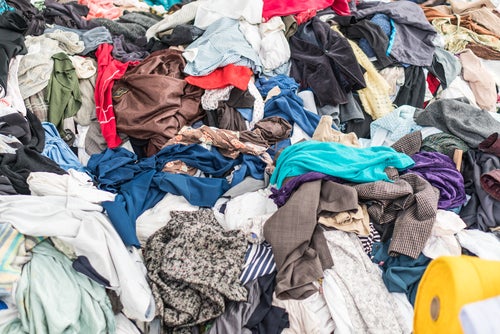
On Monday (22 May) European Union governments reportedly agreed the bloc should ban the destruction of unsold textiles. The decision aligns with the EU’s commitment to reducing waste and promoting greater reuse and recycling practices.
According to a Reuters article, textile consumption in Europe has emerged as one of the leading contributors to environmental impact and climate change, ranking fourth after food, housing, and mobility. The article goes on to say that approximately 5.8 million tonnes of textiles are discarded each year in the EU, amounting to roughly 11 kilograms (24 pounds) per person. A substantial portion of these discarded textiles end up in landfills or are incinerated.
Based on The Fashion Law’s account, the EU governments, together with the European Parliament, are working towards implementing the Ecodesign for Sustainable Products Regulation, which requires their mutual agreement. Initially proposed by the European Commission in March 2022, the regulation stipulates that destruction bans may be put in place after a later assessment by the Commission.
The report continues to say that EU governments have now decided that an immediate destruction ban on unsold clothing should be enforced, eliminating the need for a potentially lengthy assessment process by the EU executive, which could have taken up to three years. While the agreement is in place, medium-sized companies, employing fewer than 250 workers, will have a transition period of four years to comply, while the smallest companies, with fewer than 50 employees, will be exempt.
Sheng Lu associate professor in the Department of Fashion and Apparel Studies at the University of Delaware, tells Just Style exclusively: “The new EU ban on the destruction of unsold textiles reflects the ongoing trend of more restrictive legislation to address the fashion industry’s negative environmental impacts and push companies to adopt a more sustainable business model. In response to the new rule, EU-based fashion companies are likely to continue to expand their second-hand clothing business, increasingly using recycled textiles in their products and offering services like apparel repair. The new rules’ implications for companies’ inventory management, sourcing practices and even discount strategies are also interesting to watch.
“Additionally, it is critical to recognise that apparel is a global business and even EU-specific legislation could have global implications. For example, there should be a level playing field for apparel companies selling only in the EU and those with a worldwide presence. Likewise, the new legislation may affect foreign investors’ interest in building new textile recycling facilities in the EU, or discourage investors from opening new EU-based retail stores. Also, helping fashion companies go through the transition, especially during current economic challenging times (e.g., high energy bills, hiking inflation and economic slowdown), will be essential.”
Spain is reportedly set to assume the EU presidency in July, and is expected to lead negotiations on the law alongside representatives from the European Parliament. Although the Parliament is yet to establish its position, there are indications that it may support a ban on destroying unsold textiles and electronic appliances.
The European Commission is understood to have identified the destruction of unsold consumer products, particularly textiles and footwear, as a growing concern across the EU, exacerbated by the rise of online sales, according to Business of Fashion. By implementing a ban on the destruction of unsold textiles, the EU takes a crucial step towards mitigating waste, conserving resources, and fostering a sustainable business environment.



